Environment
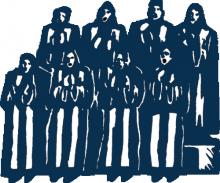
The deep, dark secret of the church is that the beliefs and convictions of Christians are often shaped far more by the hymns we sing than the theological tomes gathering dust on our bookshelves. Songs are avenues for praising God, but they are also tools for imparting knowledge. Singing is a theological exercise, so the words printed in hymnbooks or flashed on screens deserve attention and reflection.
“How Great Thou Art” has been sung in churches, automobiles, and probably the occasional shower since the late 19th century. Long used in traditional worship services, many contemporary artists are offering their own renditions of this classic and adapting it for more contemporary settings. Even Carrie Underwood (no relation) is getting into the act.
This is an ode to God’s majesty and power. It testifies to the beauty created by God’s hand and witnesses to the connection between the love behind God’s creative acts and the love poured out by Christ on the cross.
The famous opening line, “O Lord my God, When I in awesome wonder, Consider all the worlds Thy Hands have made” sets the stage. They also easily get stuck in your head playing on endless loop.
Creation – stars, thunder, forest, birds, majestic mountains, gentle breezes, and everything else – indicates the greatness of God. It provokes wonder among us humans, forcing us to acknowledge the subordinate relationship between creature and Creator. We cannot do what God has done; our accomplishments will always pale in comparison.

I invite you to stop reading this now, listen to a copy of the hymn “For the Beauty of the Earth,” and go sing it in celebration while walking around your neighborhood.
If you’re still with me, I’ll explain why:
Since learning the hymn several years ago, it has come to mind in many memorable places that now fill my mental landscape whenever I sing the hymn. One of those places is a park overlooking the Anacostia River near my house in Washington, D.C. Kenilworth Park was built on the site of a city dump that was plowed over 40 years ago and is now undergoing a remediation process to control suspected groundwater contamination. But despite its tainted legacy, it’s still one of the most beautiful places in Washington D.C.
The park constantly reminds me of the distance between what is and what could be. It’s full of potential, but sometimes the park’s potential is the only positive thing I see. On a recent walk through it, I came to my favorite overlook across from the National Arboretum and was momentarily struck by the contrast. The overlook is always full of trash from the river and at times overgrown with invasive plants, but this time, as I walked up, I caught a glimpse of a Northern Harrier flying along the river. I had never seen a Northern Harrier, much less so close to my house and in such an unlikely place. It momentarily caught me and my bird-watching friends breathless; we were reminded of the potential always hidden within the park.
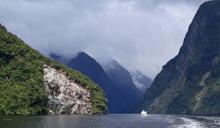
Praise God, from whom all blessings flow;
Praise [God], all creatures here below;
Praise [God] above, ye heavenly host;
Praise Father, Son, and Holy Ghost, Amen.
Words by Thomas Ken (1674)
The Doxology was my favorite hymn growing up. We would sing it every Sunday in church at the end of the service, mostly a cappella. I was amazed at the different harmonies and range in which the hymn could be sung. I loved how simple the words were. But I did not understand the words fully until well into my adult life. As a kid, I immediately disregarded things like animals, plants, insects, and fish as creatures that could praise God. Surely the act of praising God is only reserved for the sentient beings, with a conscience and the ability to say in words “praise God.” No way would God receive the praises of a mosquito, or fern or cat or pig.
It took the glory of creation itself for me to fully understand the words of the Doxology. A year out of college, I was sitting on a kayak in the middle of Doubtful Sound, New Zealand surrounded by snowcapped peaks that dropped right into the water. The sun was shining, dolphins were swimming nearby, and the birds were chirping. Then the song hit me “Praise God, all creatures here below.” I could hear the songs of praise from his non-human creatures. It finally dawned on me that my songs of praise paled in comparison to the winds that touch the peaks of mountains, the perfect songs of birds and the language of dolphins. They are all songs of praise!
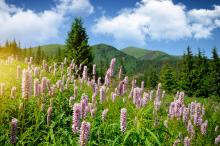
Many years ago, I sat in a church that resembled nothing like the church that I barely frequented while growing up. As the overhead lights dimmed in preparation for opening song, a blue-ish red hue washed over the stage to what felt like a concert opening and the following lyrics for “Indescribable” emerged on two oversized screens flanking the worship team:
From the highest of heights to the depths of the sea
Creation’s revealing Your majesty
From the colors of fall to the fragrance of spring
Every creature unique in the song that it sings
All exclaiming …
These song lyrics stuck with me because they remind me of how God is manifest in our natural world, where grace and interconnectedness are reflected in species that are intricately dependent on one another, and where the sheer beauty of our earth often becomes more apparent when we are able to step away from our industrialized lives and behold a starry night or a hike in the woods.
These lyrics also remind me of the part in Genesis where Adam is first put in charge of taking care of Eden and then gets to name all the animals, implying that he is responsible for them too:
“The Lord God took the man and put him in the Garden of Eden to work it and take care of it … Now the Lord God had formed out of the ground all the wild animals and all the birds in the sky. He brought them to the man to see what he would name them; and whatever the man called each living creature, that was its name. So the man gave names to all the livestock, the birds in the sky and all the wild animals …” (Gen 2:15; 19-20).
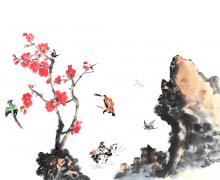
In these days barren fields will sprout trees
The deaf and blind will hear and see
The dead will raise and begin to breathe
The earth will groan in pain to see
The sons of God declare to be
His full and glorious family
The beautiful, perfect bride of Thee (Wash Me Clean, Page CXVI)
I am a city girl through and through — I’ve never lived outside of an urban context. Although my family lived in Queens (represent!), our church and community were in the dense and often treeless “ghetto” of Alphabet City, a neighborhood on the Lower East Side of Manhattan. My experiences of nature have mostly consisted of front and back yards, parks, and occasional trips to the beach or camping. And because I grew up in and spent most of my life in communities of the poor and marginalized, most of my experiences of God have centered around what Divine mercy, justice, healing, liberation, and restoration look like in the human heart.
In other words, it’s very easy for me to grasp the idea of a “New Jerusalem” or “a city whose architect and builder is God.” It’s easy for me to see the human component of God’s kingdom and what it means for people. It’s not so easy for me to imagine trees “clapping their hands” or even fully to appreciate the majesty of God’s handiwork in the stars ... because I’ve rarely seen a night sky free from light pollution. It’s not easy for me to imagine what a renewed creation would look like apart from new hearts and restored people.
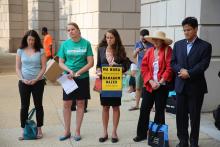
This week began in song and prayer outside the Environmental Protection Agency.
The government employees walking past our prayer circle definitely thought we were unusual; for Sojourners, though, publicly witnessing to our calling as Christians in care for creation is just another day on the job. We gathered with interfaith partners for a morning blessing to kick off the EPA’s hearings on the Clean Power Plan – an ambitious plan to curb carbon emissions from our largest source, power plants. Our goal was to show EPA and the nation that people of faith care deeply about what human sin has done to creation, and how all of God’s creation – including people – are suffering and will continue to suffer from climate change.
The next day, I was back at the EPA, this time to offer my testimony during their second day of hearings.
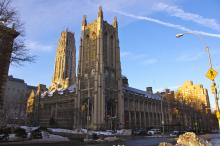
Last week, Serene Jones, president of Union Theological Seminary, announced that the school is divesting its endowment of fossil fuels. It is the first seminary in the world to do so, marking Union’s latest action in a long legacy of social justice commitments.
So what? Well, it helps to look at this news in context.

New York City’s venerable Union Theological Seminary plans to pull all investments in fossil fuels from its $108.4 million endowment, casting it as part of a bid to atone for the “sin” of contributing to climate change.
Union’s portfolio has been investing 11 percent (or about $12 million) of its endowment in fossil fuels. Jones did not mince words in condemning the school’s contributions to fossil fuel, quoting “the wages of sin is death” from Scripture.
“We have sinned, and we see this divestment as an act of repentance for Union,” Jones wrote in an op-ed for Time magazine. “Climate change poses a catastrophic threat. As stewards of God’s creation, we simply must act to stop this sin.”
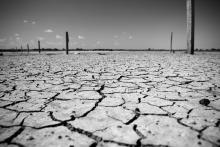
Climate change is about people, not just science and politics — it is an inter-generational ethics issue. The earth is the Lord’s, and in Genesis, God entrusts us with caring for Creation. The earth that we leave to future generations is already being changed by climate change, and so far, our nation has done little to stop climate pollution. The Clean Power Plan, announced Monday by the EPA, is a great step forward for our country in taking climate change seriously.
The policy will treat carbon the way it should be treated — as a pollutant that’s harming our health and our planet. It will reduce our carbon pollution 30 percent below 2005 levels by 2030, but will allow each state the flexibility to decide how it reaches that goal.
The rule reflects some of the best values we hold dear. It will help prevent premature deaths and asthma attacks caused by smog and other air pollutants. But most importantly, it will reduce the pollution that fuels climate change. It’s clear that President Obama cares about the legacy he leaves to today and into future generations. While there is a lot more that can and should be done by this administration and by Congress, President Obama deserves our appreciation for embracing the common good and taking such a big step to preserve the earth for our grandchildren’s grandchildren.

About 30 global religious leaders working in their churches and organizations on environmental justice and advocacy for climate change met last month for the World Council of Church’s (WCC) Working Group on Climate Change in Wuppertal, Germany.
This group tackled the urgent issue of climate justice — as there are environmental problems caused by rich nations that affect others. This includes, for example, the great Pacific garbage vortex and depletion by U.S., Japanese, and Norwegian fishing of species, such as cod, on which smaller countries depend for sustenance, creating conditions that affect vulnerable communities around the globe. Climate change is affecting those in Africa as it dries up their land and enlarges the size of the Sahara desert. It affects Asia as huge storms flood broad areas of coastline, devastating homes and lives. Climate change is affecting the most vulnerable populations, which live near vulnerable croplands and shorelines and depend on farming and fishing for their livelihood. Climate change creates weather that takes lives and destroys communities.
Climate change workers realize that those who have contributed the least to CO2 emissions are (and will be) suffering the worst consequences.
The U.S. Environmental Protection Agency just released its new plan to cut carbon pollution from power plants, the first policy of its kind. This plan will cut carbon dioxide pollution from existing fossil fuel power plants 30 percent below 2005 levels by the year 2030. EPA could have chosen a better benchmark, since we’re already 13 percent below our 2005 pollution levels because of the recession and natural gas. But this plan still carries many benefits: it allows the states flexibility in meeting the 2030 goal, and the reduction in smog is projected to prevent 2,700 to 6,600 premature deaths and 140,000 asthma attacks in children. It also shows the U.S. is finally taking leadership on global warming, which is likely to have an impact on the world stage.
EPA Administrator Gina McCarthy is speaking in a press conference at 10:30 am Eastern Time about details of the new rule; C-SPAN is streaming it live online.
You can find the full rule as well as summaries and analyses here.
To join Sojourners in responding to the rule via public comment, join us HERE.
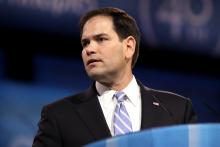
Why is it so difficult for some people to respond to climate change in a thoughtful way? Sen. Marco Rubio says he doesn’t believe human activity is causing changes to the global climate. He told ABC News: “I do not believe that human activity is causing these dramatic changes to our climate the way these scientists are portraying it, and I do not believe that the laws that they propose we pass will do anything about it, except it will destroy our economy.”
But if Sen. Rubio believes that humans aren’t causing climate change, who does he believe is? Does he believe that climate change is natural, perhaps an act of God? The senator is a Christian , and he would be wise to listen to the words of a variety of religious leaders who have spoken about care for creation.
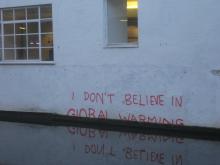
This week the National Climate Assessment Report was released, documenting the disruptions already being experienced due to global warming. President Obama has tried to raise the alarm by talking about the Report with weather reporters in different cities.
What’s amazing to me are not the findings of the report. More flooding, extreme temperatures, drought, severe wildfires — these have been predicted for years. And the crushing effects of global warming around the world are felt most by the poor and marginalized.
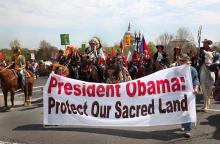
Editor's Note: Today’s #EarthWeek action: Join us for a prayer conference call at 2:30 pm Eastern Time as we hear from the evangelicals standing against the Keystone XL pipeline, and pray a blessing over them and their work. Click here to RSVP.
Maybe I’m a near-sighted, Bible-thumping holy roller, but I can’t see angel wings flapping on oil executives. No doubt some are community pillars. They’re Little League umpires, tithers, and PTA volunteers. They’ve got lovely houses and manicured lawns.
But they’re also flawed like the rest of us, and their professional bias screens out the obvious: The proposed Keystone XL Oil Pipeline would do little good and could wreak enormous harm. I’m compelled to halt my timid thy-will-be-done prayers and join a band of evangelicals boldly pleading for the permit’s denial. We’ve even launched a Facebook page, called “Pray No KXL.”

When God coupled the earth with the breath of eternity, our souls and the soil were fused and our destinies perpetually intertwined. While many of us have been taught that human beings have dominion over the Earth, we have not understood that what we do to Mother Earth, we do to one another and to God.
Dominion theology has led to domination, abuse, and destruction of Mother Earth and human communities. Every time we strip the land of its diversity, we strip a layer of humanity from our collective souls. Soil is also a community of diverse beings — some visible to the naked eye, some microscopic. A diversity of beings distinguish fertile soil from lifeless dirt. When industrial agriculture or chemical spills make these beings homeless, our soil becomes dust and is gone with the wind. Regardless of their visibility to the human eye, maintaining the homes of microbes intact, is what keeps the land fertile for growing crops which feed human beings. Adding microbes to “the least of these” who deserve our protection is truly an act of self preservation.
Respect and protection is a recurring casualty of dominion theology in that dominated land requires dominated people to work it. Plantations required slaves, and agribusiness requires exploited immigrants. Generational shame was whipped into the minds of enslaved Africans as their backs were abused in cultivating the land. Over the course of 400 years, a healthy relationship with Mother Earth was one of those legacies lost, stolen, or strayed for many African Americans. Restoring a healthy relationship with the land is a vital prerequisite for our urban youth to turn their food deserts into an oasis of food sovereignty.
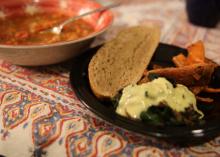
One of the best things about food and cooking is sharing. From devouring cheap local eats with best friends to inviting people over for dinner or hosting a full on party, food brings people together.
This week is Earth Week and as an intern community we are choosing to make concerted efforts to be greener in our choices to promote healthy bodies and ecosystems. This is the motivation behind Meatless Mondays. This global movement asks for restaurants, organizations, and individuals to go veggie on Mondays, being mindful of how our eating habits affect the globe.
 Editor's Note: Sojourners is celebrating Earth Week with a special message series every day next week. Click here to join us!
Editor's Note: Sojourners is celebrating Earth Week with a special message series every day next week. Click here to join us!
“Behold, I am making all things new!” says Jesus in the book of Revelation. It’s this spirit of hope and second chances that we celebrate at Easter time. Life triumphs over death and decay. We get a second chance.
But what about our planet? A cursory glance shows us that God’s creation could use some renewal.
Creation is definitely groaning. We’re losing species, spilling oil, and changing our climate at an alarming rate. We’re building sea walls and responding to pumped-up natural disasters. Energy companies are pushing for even more access to the fossil fuels that are harming God’s creation. Action from Congress seems far away, and moneyed special interests are working hard to block other kinds of action.

St. Bonaventure (d. 1274) once said, “Whoever is not enlightened by the splendor of created things is blind; whoever is not aroused by the sound of their voice is deaf; whoever does not praise God for all these creatures is mute; whoever after so much evidence does not recognize the Maker of all things, is an idiot.”[1]
If Bonaventure was right, then we’re all idiots.
The first time I travelled to Rome was an experience second to none. Never, in my young travels, had I ventured to a place so layered with history and significance around every corner that one literally couldn’t escape it. Even the Roman suburbs were historical. We were amped to see it all. Our approach was simple: we would incrementally make our way through the city over the course of 10 days with a plan that would make any explorer proud.
The sheer magnitude of historical and ecclesiastical sites to be seen in the city was overwhelming at best. Then it happened. I had a unique moment near the end of the trip. We’d been walking nonstop through museums, ruins, churches; we’d even heard the pope preach a sermon, when I started to lose my attention. Many travelers or art buffs will resonate with this — there came a point during our endless walk through Rome where I had seen so much beauty and splendor and history that I just started taking it all for granted. The last two days consisted of me walking around blindly and numbly, room-to-room, ruin-to-ruin, as though what I stood before was of little or no value.
I called it “beauty exhaustion.”

As the Intergovernmental Panel on Climate Change (IPCC) releases a groundbreaking and comprehensive report detailing the impacts of climate change as “severe, pervasive, and irreversible,” young evangelicals across the United States are coming together to pray for urgent and responsible climate action to protect life and defend their future. Organized by the Young Evangelicals for Climate Action, the Evangelical Environmental Network, and Renewal: Students Caring for Creation, prayer events are being held across the Nation — and on more than 20 Christian campuses — in recognition of April 3 as the 2014 National Day of Prayer for Climate Action.
While evangelicals are not typically associated with climate action, YECA spokesperson Ben Lowe points out,“Climate disruption is not just a scientific or political issue — it’s first and foremost a moral issue and biblical issue … It’s about protecting life and, as evangelicals, we’re particularly concerned about the ways our pollution and political inaction is affecting the poor and those who are most vulnerable.”
Communities around the world are already experiencing the negative impacts of climate change. The new IPCC reports details how the poorest countries are being seriously affected by climate change, with severe consequences to global food security, human health, and economic development. The poor will not be the only ones influenced by climate change, as IPCC Chairman Rajendra Pachauri says, "Nobody on this planet is going to be untouched by the impacts of climate change.”